The bronze age and the Celtic world - Universal History Library
The bronze age and the Celtic world - Universal History Library
The bronze age and the Celtic world - Universal History Library
You also want an ePaper? Increase the reach of your titles
YUMPU automatically turns print PDFs into web optimized ePapers that Google loves.
A RECAPITULATION 129<br />
<strong>The</strong> o<strong>the</strong>r movement went to <strong>the</strong> east, <strong>and</strong> was probably that great emigration from<br />
Europe to Asia of which dim recollections survived among <strong>the</strong> Greeks, <strong>and</strong> which took<br />
<strong>the</strong> Briges into Asia Minor, where <strong>the</strong>y became Phrygians.* It also carried to Thrace<br />
some, at any rate, of its red-haired people.' It was probably some stragglers from<br />
this group who passed southwards, like knight-errants destroying monsters <strong>and</strong><br />
punishing evil doers, <strong>and</strong> who eventually became kings over <strong>the</strong> towns of Mycenean<br />
Greece. <strong>The</strong>se were known later as Achseans, <strong>and</strong> may possibly have included also<br />
stragglers from <strong>the</strong> group which had passed over to Italy.<br />
It was between 1200 <strong>and</strong> 1175 B.C. that <strong>the</strong> next movement began, <strong>and</strong> this was<br />
mainly to <strong>the</strong> west <strong>and</strong> north. Some of <strong>the</strong>se invaders left <strong>the</strong> Danube basin, crossed<br />
<strong>the</strong> Rhine, <strong>and</strong> passing through <strong>the</strong> Belfort gap, entered France, <strong>and</strong> over-ran <strong>the</strong> greater<br />
part of that country. Until <strong>the</strong> swords of this type have been catalogued <strong>and</strong> mapped,<br />
it will be impossible to trace <strong>the</strong>ir line of advance, or to determine how far <strong>the</strong>y went.<br />
Some of <strong>the</strong>se seem to have passed ei<strong>the</strong>r down <strong>the</strong> Rhine or up <strong>the</strong> east of France, for<br />
<strong>the</strong>y crossed over to Britain, l<strong>and</strong>ing for <strong>the</strong> most part in <strong>the</strong> Thames <strong>and</strong> by <strong>the</strong> Wash,<br />
or else at some intermediate points. <strong>The</strong>y seem to have settled in <strong>the</strong> east of Engl<strong>and</strong>,<br />
<strong>and</strong> subsequently in Wessex, but later waves of <strong>the</strong>m evidently set out for Irel<strong>and</strong>,<br />
crossing Wales by <strong>the</strong> upper Severn valley <strong>and</strong> <strong>the</strong> Bala cleft. A considerable number<br />
of <strong>the</strong>se seem to have settled in Irel<strong>and</strong>.<br />
It was about this time that o<strong>the</strong>rs set out from Hungary through <strong>the</strong> Moravian<br />
gate, <strong>and</strong> while some went northwards, <strong>the</strong> majority passed along Galicia, across <strong>the</strong><br />
Bukovina <strong>and</strong> Podoha, <strong>and</strong> arrived at length by <strong>the</strong> banks of <strong>the</strong> Koban. Here <strong>the</strong>y<br />
settled for a time, <strong>and</strong> entered into trade relations with a humble tribe, living on <strong>the</strong><br />
sou<strong>the</strong>rn slopes of <strong>the</strong> Caucasus, from whom <strong>the</strong>y learned <strong>the</strong> knowledge of iron.<br />
Armed with swords with iron blades, <strong>the</strong>y returned to <strong>the</strong> Danube basin about iioo B.C.,<br />
<strong>and</strong> perhaps worked <strong>the</strong> iron mines at Gyalar, in Transylvania. <strong>The</strong>n <strong>the</strong>y settled in <strong>the</strong><br />
Hungarian plain <strong>and</strong> in <strong>the</strong> north of <strong>the</strong> Balkan peninsula. About 1050 B.C. a large<br />
body of <strong>the</strong>se people from <strong>the</strong> Koban passed southwards <strong>and</strong> descended <strong>the</strong> Vardar<br />
valley. By degrees <strong>the</strong>y passed <strong>the</strong>nce to <strong>The</strong>ssaly. <strong>The</strong>n <strong>the</strong>y began that slow but<br />
steady conquest of <strong>the</strong> Greek states, which is known as <strong>the</strong> Dorian invasion.<br />
4 Herodotus vii. 73.<br />
5 Xenophanes, quoted by Clement of Alex<strong>and</strong>ria : Stromateis vii. 711b.







